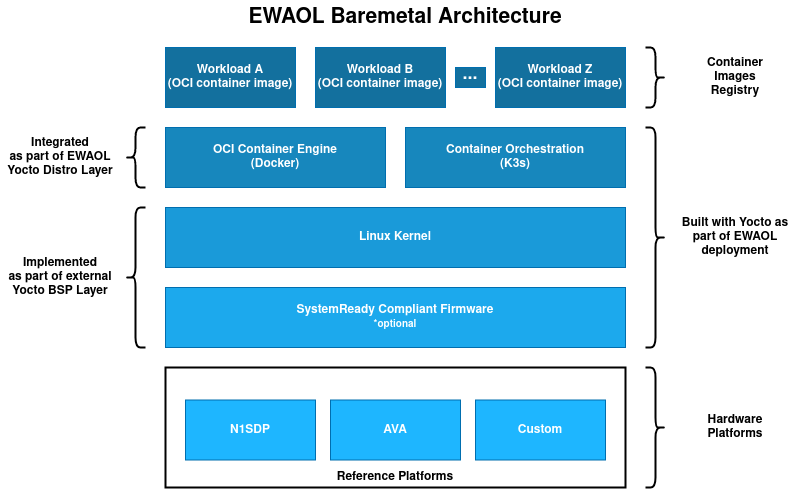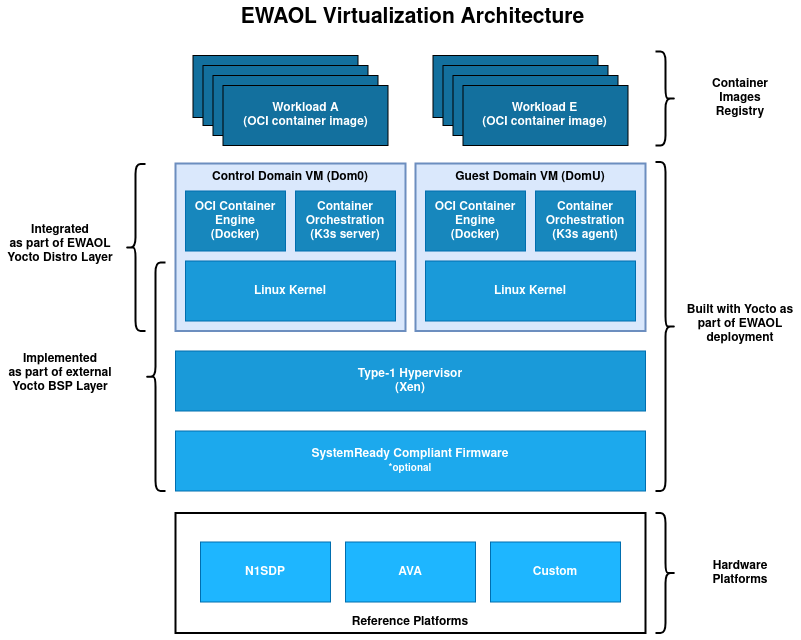Attention
System Architectures
Introduction
This page describes the two target architectures supported by the EWAOL project.
Baremetal Architecture

An EWAOL baremetal distribution image (ewaol-baremetal-image) is enabled if
ewaol-baremetal is included in DISTRO_FEATURES. The image includes the
following image features by default:
Container engine and runtime with Docker and runc-opencontainers
Container workload orchestration with the K3s Kubernetes distribution
On a baremetal distribution image system boot, a K3s Systemd service
(k3s.service) provides a container orchestration environment consisting of a
single K3s control plane and a single built-in K3s agent, communicating via the
local loopback network interface. This enables the orchestration and execution
of containerized application workloads on the baremetal distribution image,
operating as a single-node K3s cluster.
See Baremetal Architecture for details on building an EWAOL baremetal distribution image.
Virtualization Architecture

An EWAOL virtualization distribution image (ewaol-virtualization-image) is
enabled if ewaol-virtualization is included in DISTRO_FEATURES. The
image includes the following image features by default:
Hardware virtualization support with the Xen type-1 hypervisor
Container engine and runtime with Docker and runc-opencontainers
Container workload orchestration with the K3s Kubernetes distribution
On an EWAOL virtualization distribution image, the software stack includes the Xen type-1 hypervisor and provides a Control VM (Dom0) and a single bundled Guest VM (DomU), by default. Virtualization support also includes Xen-related configurations and necessary Xen-management packages into the Control VM root filesystem.
The Control VM includes the xen-tools package along with network
configuration for the xenbr0 bridge, to allow the Guest VM to access the
external network. By default, the bundled Guest VM image is based on the
generic-arm64 MACHINE.
A Guest VM is included into the EWAOL virtualization distribution image via the
ewaol-guest-vm-package recipe, with the Guest VM’s rootfs stored as a raw
image file in *.qcow2 format. In addition, this package includes a sample
Xen domain configuration file, which holds Xen-specific Guest VM settings as
detailed in xl domain configuration. By default one Guest VM (with hostname
ewaol-guest-vm1) is built and included on the virtualization distribution
image.
See Virtualization Architecture for details on building an EWAOL virtualization distribution image.
An EWAOL virtualization distribution image can be customized, including setting the number of included Guest VMs. The supported virtualization-specific customization parameters and how to set them are detailed at Customization.